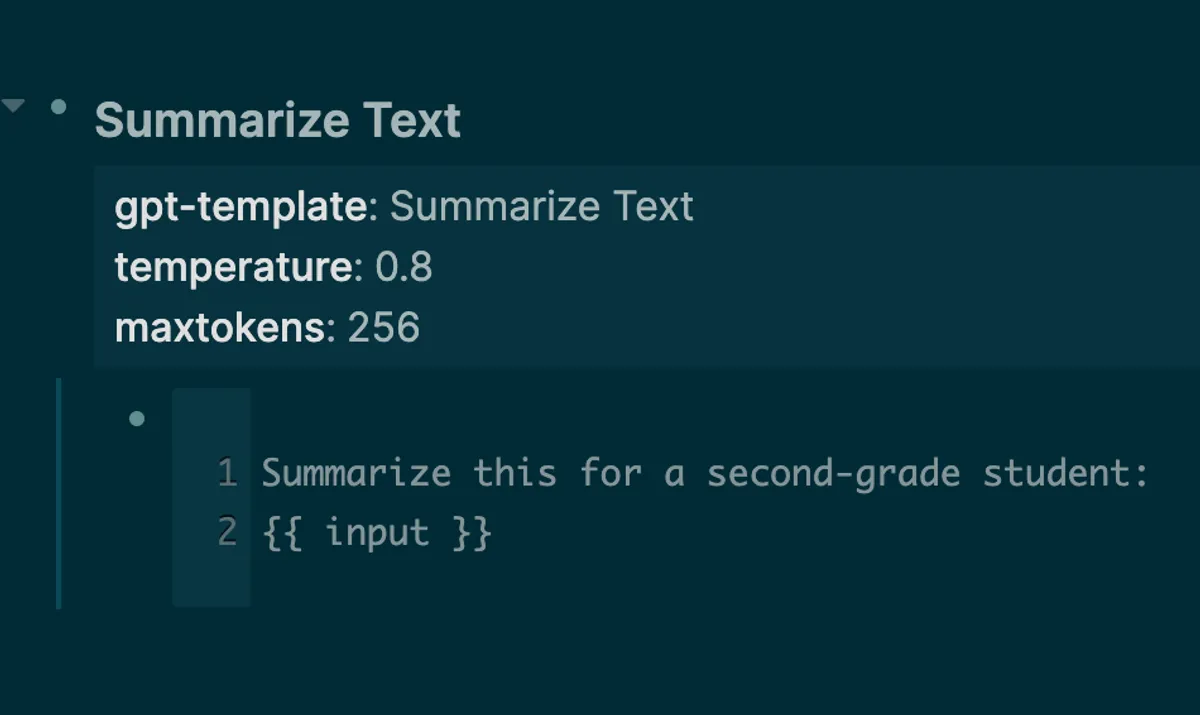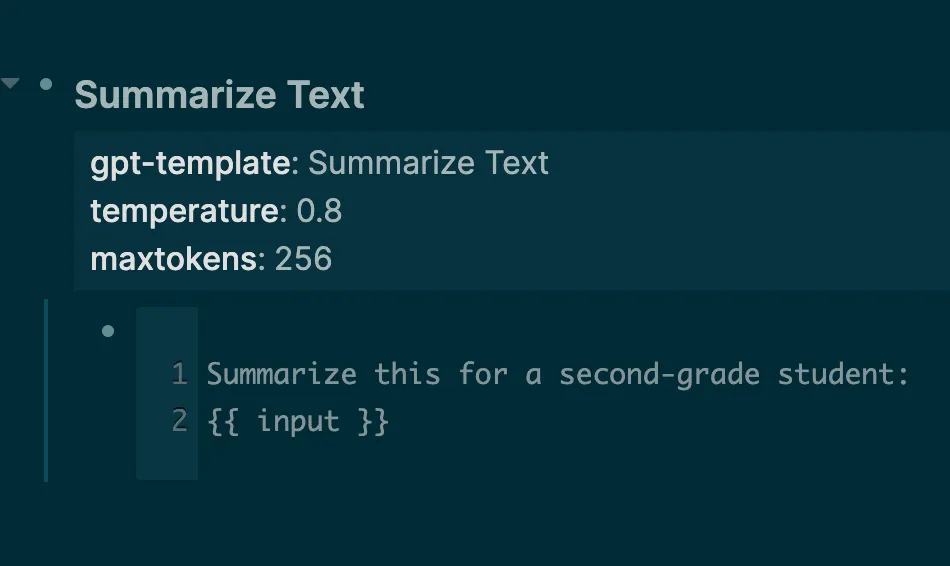Logseq GPT Prompt Templates
Thoughts on prompt templates for the Logseq OpenAI Plugin


See the Logseq GPT-3 OpenAI plugin here.
GPT-3 is a powerful machine-learning tool that can generate text. You give it natural language text, called a prompt, and it predicts what text should come after it.
The prompt can be anything from a simple question to a complex command, and it can perform many different tasks, such as translation, summarization, and basic reasoning.
Prompt Engineering
Asking AI to perform a task with natural language is simple and convenient. However, you need to phrase the prompt in very specific ways to get useful and predictable results.
For example, you can ask it to translate text using a prompt like this.
Translate Spanish to English:
Yo vivo en Granada, una ciudad pequeña que tiene monumentos muy importantes como la Alhambra.
Sometimes this will work and translate the sentence into English, but since GPT-3 predicts the next phrase, it will often just continue writing Spanish instead of translating.
We can make the prompt more reliable by giving it more context and trying to “constrain” the possible output.
Adding Prefixes like Spanish: and English: increases the reliability.
Translate Spanish to English.
Spanish: Yo vivo en Granada, una ciudad pequeña que tiene monumentos muy importantes como la Alhambra.
English:
GPT-3 is complex and unpredictable. People are constantly finding new best practices and “tricks” to improve accuracy and reliability.
For example, researchers have discovered that just adding the phrase “Let’s think step by step” before each answer increases the accuracy on benchmarks like MultiArith from 17.7% to 78.7% and GSM8K from 10.4% to 40.7%
Q: On average Joe throws 25 punches per
minute. A fight lasts 5 rounds of 3 minutes. How
many punches did he throw?
*A: Let's think step by step.**
Zero-shot, One-shot, Few-shot
You can also include examples of the output you’re expecting in the prompt. This often (but not always) makes the output more predictable and accurate.
Prompts with examples are called one/few-shot. Prompts without solved examples are called “zero-shot.”
For example, you can include an example of an English-to-French translation. This is a “one-shot” prompt.
Translate English to French:
English: sea otter
French: loutre de mer
English: cheese
French:
GPT-3 Prompt Templates
GPT-3 needs to be prompted in very specific ways, and these often have to be discovered by trial and error. How can we share best practices and make GPT-3 easier to use? Prompt Templates
The existing Logseq template feature allows you to add text snippets to the / command.
Now you can insert the template text using the template name.
I want to make something similar for the GPT-3 plugin.

If I wanted to translate from English to French, I could use a “prompt template” known to produce good output, and inject my phrase into it. The input variables are surrounded by {{}}
We can also include GPT-3 configuration options such as temperature and maxTokens.
English to French Translation Prompt Template
Translate English to French:
English: sea otter
French: loutre de mer
English: {{ input }}
French:
Summarize Text
Summarize this for a second-grade student:
{{ input }}
Grammar Correction
Correct this to standard English:
{{ input }}
GPT Modes
Edit in Place
Edit allows you to update text in place instead of completing it and inserting it in the block below.
Correct Grammar in Place
Correct this to standard English:
Insert
The new insert capability adds the contextually relevant text in the middle of existing content.
Allows you to specify where the text should be injected by writing [[insert]] in the prompt.
Additional GPT-3 Configuration Options
The templates will allow you to specify options on a per-template basis
Model
Allow users to specify the AI model to be used, such as text-davinci-003 or code-danci-002 for code tasks.
Stop sequences
The phrase that causes GPT-3 to stop generating more text
Frequency/Presence Penalty
Settings to prevent repetition in the generated text
Top-P
It affects randomness and variance, similar to temperature
Future work
Modal Popup
I’m also planning on adding a feature where instead of writing the prompt in your notes, there will be a popup where you write the prompt and review the output before inserting it into your notes.
This feature is being developed in parallel with the template feature.
Chaining
You can accomplish much more by chaining the output from one prompt into the input of another prompt.
It would also be interesting to enrich the prompt source with calls to the internet.
Text Transformation
I’d also like to include some options to process the input or output with code or regex.
For example, you could split the output into multiple lines in logseq or extract highlighted terms from the input.